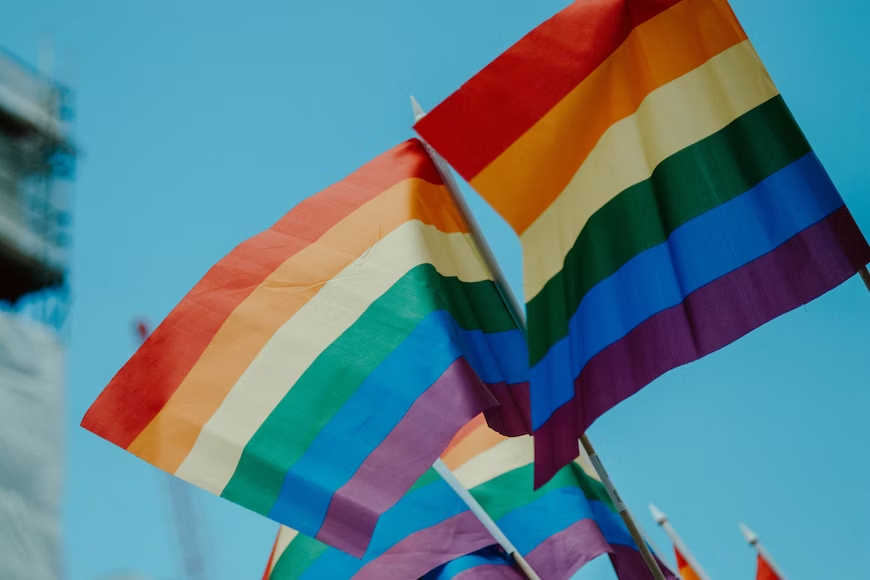Slovo General Editor Joshua Robinson reports on the impact of the 2022 anti-LGBT "propaganda" legislation in Russia.

Photo by Daniel James via Unsplash
On 24th November 2022, a bundle of bills packaged as ‘anti-gay propaganda’ measures passed their third reading in the state Duma, initiating a significant expansion – and hardening – of the notorious legislation that drew international condemnation in 2013. President Vladimir Putin signed them into law with immediate effect from December 3rd 2022.
The scope is significantly farther-reaching than the infamous 2013 ‘anti-gay’ law. The caveat that limited restrictions to ‘distribution of propaganda to minors’ has been removed, effectively criminalising any distribution of ‘propaganda’. Particularly significant is the criminalisation of ‘untraditional relations’ without clarification. Public same-sex expression of any type – from lectures and concerts to hand-holding – fall under the remit of the restrictions if carried out in a space with other people present.
The consequences are personally and financially ruinous. An individual can be fined up to 400,000 roubles (c. 5200 USD), equal to around a year’s average salary in Russia. This is four times higher than the most severe fines threatened by the 2013 anti-propaganda law. Organisations can face a bankrupting 10 million rouble penalty (c. 132,000 USD) for the same violations, ten times higher than the mandate of the preceding legislation.
The most severe punishments are reserved for “use of media to propagandise non-traditional relations”, an amendment introduced by two Communist Party deputies which, along with repeat offences for breaches of any of the clauses, warrants jail-time of up to five years.
While the prison terms are several years shorter than those set out in other post-war censorship legislation concerning the ‘discrediting of the Russian armed forces’, they further the impression that non-traditional sexualities are considered a threat to the Russian nation and state.
Origins
This is by no means the first post-war attempt to harden legislation shoring up so-called ‘traditional family values’. As early as July, Communist Party deputies proposed a bill aimed at curbing ‘childfree’ lifestyles and the promotion of “non-traditional sexual orientations”. On the one hand, we can easily set the laws into a long-term narrative in Russian politics and society of Russia as a bulwark of tradition and religion, the last refuge of the family from a morally corrupt and decaying West. It is also possible to view the legislation as the latest culmination of a more specific narrative, one that historian Dan Healey has termed ‘the Kremlin’s political homophobia project’, and has its roots deep in the Soviet past.
However, the timing and focus of the laws – which explicitly merge ‘non-traditional relations’, homosexuality, ‘propaganda’, gender-transition and paedophilia into a usefully adaptable hydra that constantly seeks to destroy Russia’s society and demographic stability – are likely a reaction to unsatisfactory results in the war in Ukraine. Passionate speeches decrying the corruption of children and the degradation posed by same-sex relations to Russia’s future were televised as a distraction away from Ukraine’s successful eastern counteroffensive, which eventually led to the recapture of Kherson city by Ukrainian troops in the south.
LGBTQ people have become the Kremlin’s preferred scapegoat since 2013, and attacks on queer visibility usually go down well with an electorate which harbours strongly homophobic attitudes, despite a slight softening in recent years. A 2020 Levada poll showed that 18% of Russia’s population said that they wanted LGBT people ‘eliminated’, down from 21% in 2015.[1]
Deputies also know that any legislation
promoting traditional values is a favourite of the President. Multiple parties
introduced competing bills throughout 2022, each more severe and further from
reality than the last, hinting at parliamentary competition for presidential
approval. Sponsoring anti-propaganda bills is an easy way to shore up one’s
traditionalist credentials and demonstrate commitment to the Kremlin’s
projects.
Impacts
‘Non-traditional relations’ remain undefined in the legislation, rendering its application as broad as authorities require it to be. This allows it to have a powerful normative effect, on organisations such as commercial businesses, educational institutions, charities, and on the behaviour and psyche of individual LGBT Russians.
Even before the law was signed, publishers scrambled to censor literature that referenced same-sex relationships. One video posted on the RUSSIA NEXT Telegram news channel shows a purportedly new copy of ‘Shattered’ by Max Falk, published by independent publisher LikeBook, with references to same-sex relationships inked out.[2] A number of publishers, such as Popcorn books, are now under investigation by the authorities for ‘propagandising’ same-sex relationships.[3] The ‘cancel culture’ that Kremlin media professionals such as Olga Skabayeva adore to admonish in bombastic talkshows has become most overt in post-war Russia itself.
It is still possible to have a life as an LGBT person in Russia, but that life has to be lived in increasingly private, if not secretive spaces. LGBT groups proliferate over Telegram, same-sex dating apps remain unblocked, queer activist spaces such as St. Petersburg’s Действия still run their lectures in secret locations, and even the most public queer spaces, Russia’s gay bars, remain open – though, as I noted in February, the already slimmest of rainbow flags has been replaced with new, more neutral branding. Police checks on queer bars, ostensibly routine, have increased, but not wildly out of proportion with checks on non-LGBT commercial establishments.
Though the laws specifically pathologise LGBT people, they should be contextualised amongst a host of post-war censorship legislation. It is more likely that the 2022 tightening of laws will be applied in tandem with the application of Foreign Agent status as we have seen before the full-scale invasion began.
What the laws impose, despite their haphazard application, is a blanket reduction on LGBT visibility. In the short-term the legislation will produce a series of sporadic and high-profile exemplary cases. In the long-term, it will shape societal attitudes, suppress LGBT expression and quality of life, and implore LGBT people to develop new strategies to exist in an increasingly closed society.
Back to Blog List

